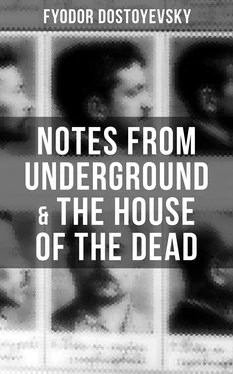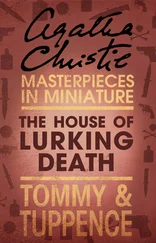Fyodor Dostoyevsky
Notes from Underground & The House of the Dead
Published by

Books
- Advanced Digital Solutions & High-Quality eBook Formatting -
musaicumbooks@okpublishing.info
2017 OK Publishing
ISBN 978-80-272-3493-6
The House of the Dead The House of the Dead Table of Contents PART I CHAPTER I CHAPTER II CHAPTER III CHAPTER IV CHAPTER V CHAPTER VI CHAPTER VII CHAPTER VIII CHAPTER IX CHAPTER X CHAPTER XI CHAPTER XII PART II CHAPTER I CHAPTER II CHAPTER III CHAPTER IV CHAPTER V CHAPTER VI CHAPTER VII CHAPTER VIII CHAPTER IX CHAPTER X
Notes from Underground
Table of Contents Table of Contents The House of the Dead The House of the Dead Table of Contents PART I CHAPTER I CHAPTER II CHAPTER III CHAPTER IV CHAPTER V CHAPTER VI CHAPTER VII CHAPTER VIII CHAPTER IX CHAPTER X CHAPTER XI CHAPTER XII PART II CHAPTER I CHAPTER II CHAPTER III CHAPTER IV CHAPTER V CHAPTER VI CHAPTER VII CHAPTER VIII CHAPTER IX CHAPTER X Notes from Underground
PART I PART I Table of Contents
CHAPTER I
CHAPTER II
CHAPTER III
CHAPTER IV
CHAPTER V
CHAPTER VI
CHAPTER VII
CHAPTER VIII
CHAPTER IX
CHAPTER X
CHAPTER XI
CHAPTER XII
PART II
CHAPTER I
CHAPTER II
CHAPTER III
CHAPTER IV
CHAPTER V
CHAPTER VI
CHAPTER VII
CHAPTER VIII
CHAPTER IX
CHAPTER X
Table of Contents
CHAPTER I
TEN YEARS A CONVICT
Table of Contents
Among the mountains and impenetrable forests of the Siberian desert one comes from time to time across little towns of a thousand or two inhabitants. They are built entirely of wood and are very ugly, with two churches-one in the centre of the town, the other in the cemetery. These places are, in fact, much more like good-sized villages on the outskirts of Moscow than towns properly so called, and are generally administered by an inspector of police, a body of assessors, and some minor officials. It is cold in Siberia, but the great advantages of Government service compensate for that. The inhabitants are simple folk without liberal ideas; their manners are old-fashioned, solid, and unchanged by time. The officials who, of course, form the nobility in Siberia, either belong to the country, deep-rooted Siberians, or have migrated from Russia. The latter come straight from the large cities, tempted by the high pay, the extra allowance for travelling expenses, and by hopes (not less seductive) for the future. Those who know how to adapt themselves to conditions in Siberia almost always remain there; the abundant and richly flavoured fruit which they gather recompenses them amply for what they lose.
As for the others, light-minded persons who are unable to deal with the problem, they are soon bored in Siberia, and ask themselves with regret why they were so foolish as to come. They impatiently kill the three years for which they are obliged by their sentence to remain, and as soon as their time is up they ask to be sent back, and return to their original homes, decrying and ridiculing Siberia. They are wrong; for it is a happy country, not only as regards the Government service, but also from many other points of view.
The climate is excellent, the merchants are rich and hospitable, the Europeans in easy circumstances are numerous. As for the girls, they are like roses and their morality is irreproachable. Game is to be found in the streets, and throws itself upon the sportsman’s gun. People drink champagne in prodigious quantities. The caviare is astonishingly good and most abundant. In a word, it is a blessed land, out of which it is only necessary to be able to make profit; and much profit is in fact made.
It was in one of these little towns-gay and perfectly selfsatisfied, whose population left upon me the most agreeable impression-that I met an exile, Alexander Petrovitch Goriantchikoff, formerly a landed proprietor in Russia. He had been condemned to hard labour of the second degree for assassinating his wife. After undergoing his punishment often years’ hard labour, he lived quietly and unnoticed as a colonist in the little town of K. To tell the truth, he was on the register of a neighbouring district; but he resided at K, where he managed to get a living by giving lessons to children. In the towns of Siberia one often meets exiles thus engaged: they are not looked down upon, for they teach the French language which is so necessary in life, and of which without them no one in the distant parts of Siberia would have the least idea.
I saw Alexander Petrovitch for the first time at the house of an official, Ivan Ivanitch Gvosdikof, a venerable old man, very hospitable, and the father of five daughters for whom the highest hopes were entertained. Four times a week Alexander Petrovitch gave them lessons, at the rate of thirty silver kopecks a lesson. His external appearance interested me. He was excessively pale and thin, still young-about thirty-five years of age-short and weak, and always very neatly dressed in the European style. When you spoke to him he looked at you most attentively, listening to your words with strict politeness and a reflective air, as though you had set him a problem or wished to extract a secret from him. He replied clearly and shortly; but in doing so weighed each word, so that one felt ill at ease without knowing why, and was glad when the conversation came to an end. I asked Ivan Gvosdikof about him. He told me that Goriantchikoff was of irreproachable morals, otherwise he would not have entrusted him with the education of his children; but that he was a terrible misanthrope, who avoided all society; that he was very learned, a great reader, and that he spoke but little, and never entered freely into a conversation. Some people said he was mad; but that was not looked upon as a very serious defect. Accordingly, the most important persons in the town were ready to treat Alexander Petrovitch with respect, for he could be useful to them in writing petitions. It was believed that he was well connected in Russia. Perhaps, among his relations, there were some who were highly placed; but it was known that since his exile he had broken off all contact with them. In a word, he was his own executioner. Everyone knew his story, and was aware that he had killed his wife through jealousy less than a year after his marriage and that he had given himself up to justice, which had made his punishment much less severe. Such crimes are always looked upon as misfortunes, which must be treated with pity. Nevertheless, this extraordinary man kept himself obstinately apart, and never showed himself except to give lessons. In the first instance I paid no attention to him; then, without knowing why, I found myself interested in him. He was rather enigmatic; to converse with him was quite impossible. Certainly he replied to all my questions, he seemed to regard it as a duty to do so; but when once he had answered I was afraid to question him further.
After such conversations one could observe on his countenance signs of suffering and exhaustion. I remember one fine summer’s evening leaving Gvosdikof’s house in his company. It suddenly occurred to me to invite him to come in and smoke a cigarette. I can scarcely describe the fright which showed itself in his countenance. He became confused, muttered incoherently, gave me an angry look, then suddenly fled in the opposite direction. I was astonished afterwards when he met me: he seemed to experience, on seeing me, a sort of terror, but I did not lose courage. There was something in him which attracted me.
Читать дальше













